I had such fun working with 4th-graders in their language arts class today. They are studying words with the root foli-, which means “leaf.” So we headed outside to look for real-life examples of foli- words. But first we reviewed several prefixes, including:
Uni- (one)
Bi- (two)
Tri– (three) (also Tre-)
Quatre- (four)
Quinque- (five)
Multi- (many)
Per- (through)
De- (from, of)
Ex- (out of, from)
With that, see how many of these words you already know… (EDIT: I’m not sure why the boldfaced type got so messed in the text that follows — my entry looked fine, but it’s showing up differently.)
Foliage (leaves, leafage; cluster, especially as in tree or forest or shrub)
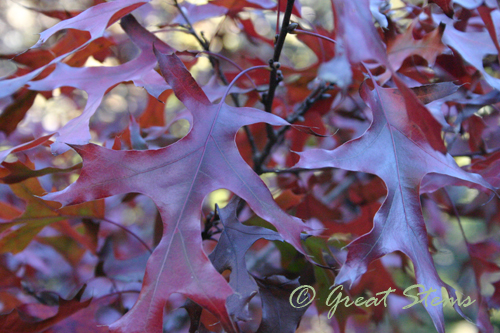
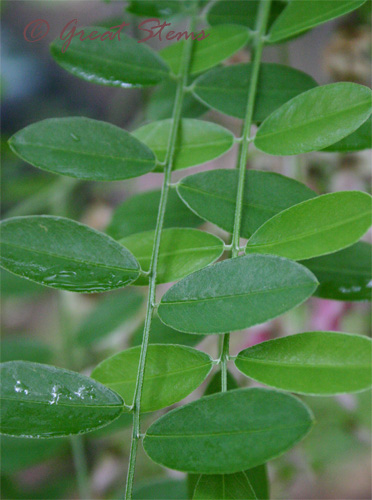
Foil (a leaf; a thin sheet of metal) Sure you know what foil is, like aluminum foil. But did you know it came from the latin root meaning “leaf”?
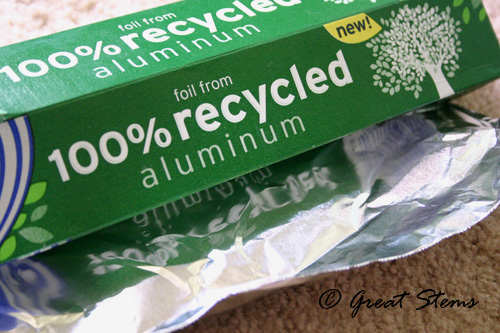 Exfoliate (to peel off in layers or flakes, as the bark of certain trees) Golden-cheeked warblers use the exfoliated strips of the Ashe Juniper to build their nests.
Exfoliate (to peel off in layers or flakes, as the bark of certain trees) Golden-cheeked warblers use the exfoliated strips of the Ashe Juniper to build their nests.
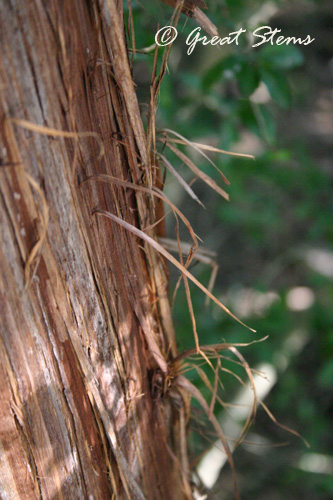
Texas Persimmon’s exfoliating bark is remarkably beautiful.
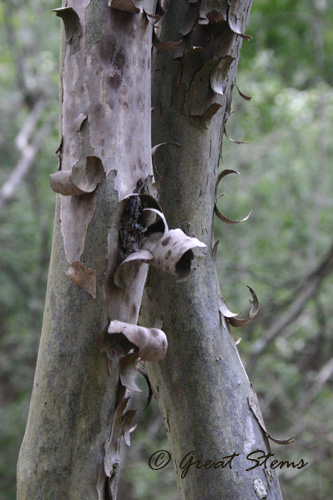
Defoliate, or Defoil (to deprive of leaves; to cut or pick off leaves prematurely) Insects and caterpillars can strip a plant of its leaves, but bonsai gardeners sometimes purposely defoliate their trees, too, to force the growth of a new set of leaves.
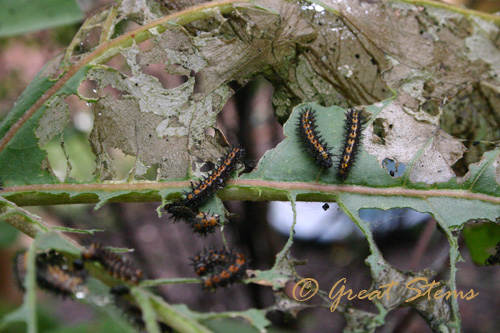
Folium (leaf, especially a thin leaf) Thin enough to let the light shine through!
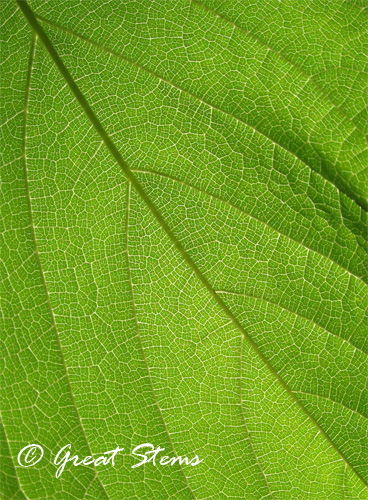
A folium is also a specific algebraic curve, such as the Folium of Descartes.
Foliation (process of forming into a leaf or leaves; the way leaves are arranged in the bud). Here’s a budding Mexican Redbud from last spring.
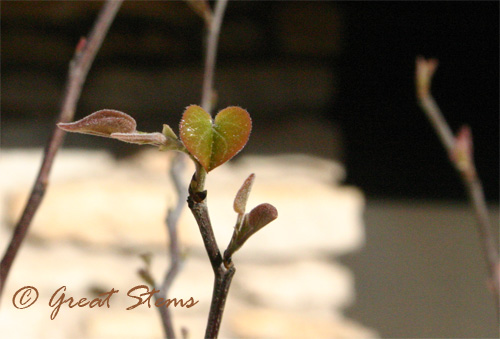 Trifoliate (having three leaves) Wood sorrel is a fine example of a plant with three leaves.
Trifoliate (having three leaves) Wood sorrel is a fine example of a plant with three leaves.
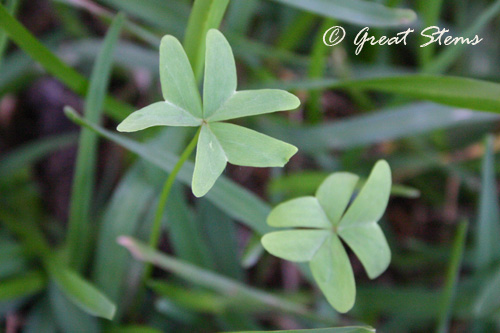
Trifoliolate (divided into three leaflets) There are many well-known trifoliolates, including Columbine…
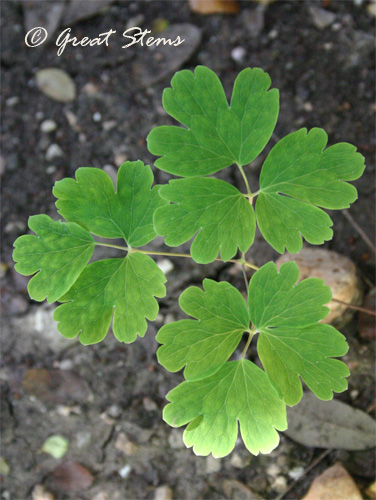
Wafer Ash, or Hop Tree (even its scientific name shows that it’s 3-leaved: Ptelea trifoliata)…
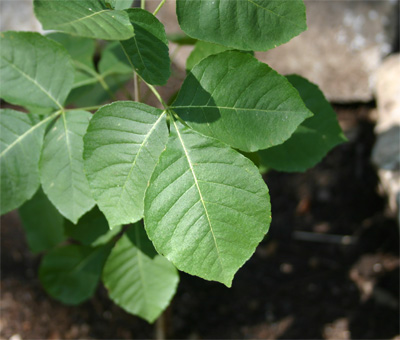
And of course, Poison Ivy.
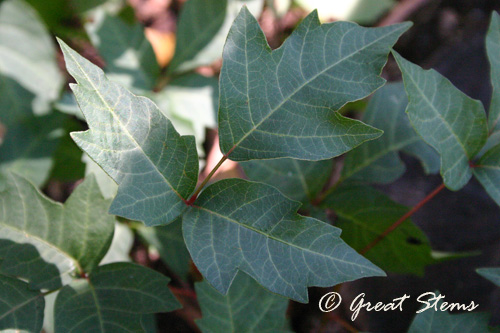
Trifolium, or Trefoil (Clover, a plant with 3 leaflets) Good ol’ Clover. Of course, clover is also technically a trifoliolate.
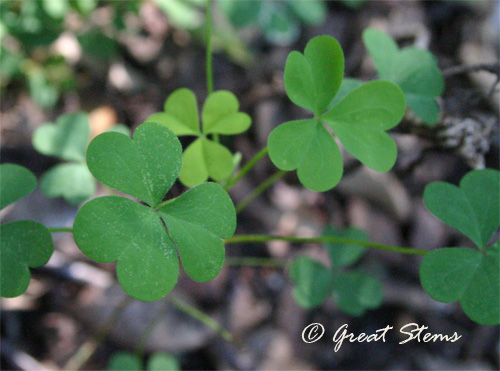 Quinquefoliolate (having five leaflets) The Texas Star Hibiscus is one such quinquefoliolate. Just look at those 5 long fingers…
Quinquefoliolate (having five leaflets) The Texas Star Hibiscus is one such quinquefoliolate. Just look at those 5 long fingers…
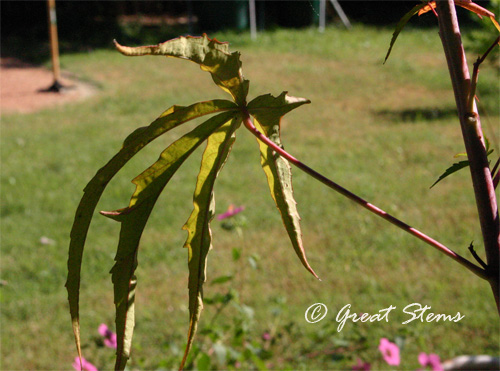 Virginia creeper typically has 5 leaflets, too, though it sometimes has 7.
Virginia creeper typically has 5 leaflets, too, though it sometimes has 7.
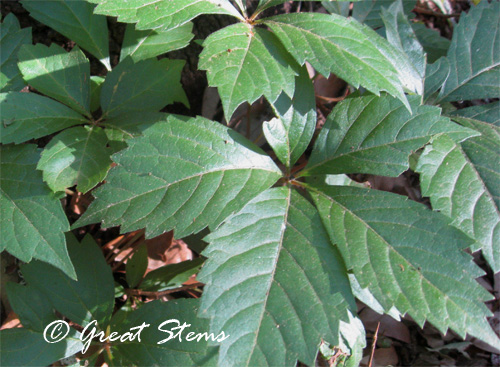
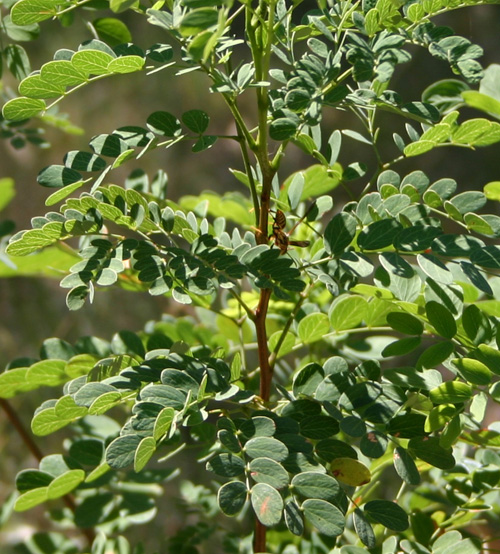
Some plants can be 3-foliolate, 5-foliolate, 7-foliolate, or just plain multifoliolate. Dewberry is one of those plants — 3- or 5-leaflet sets all on the same vine.
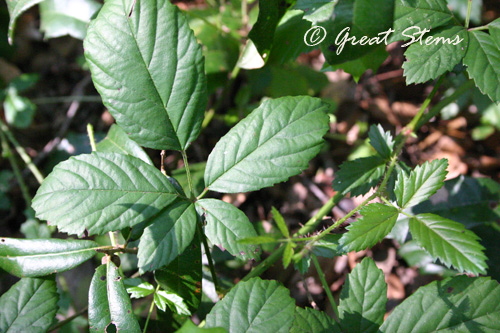
FYI, sometimes people use “foliate” and “foliolate” (with their prefixes) interchangeably, but technically “foliolate” refers to leaflets. There just aren’t many plants that have a single leaf or two leaves total — there are some orchids, though, that do qualify. But “foliolate” is more accurate for plants with leaflets. It’s just annoying to say.
Here are a few more foli- words:
Bifoliate (having two leaves)
Bifoliolate (having two leaflets)
Defoliant (a chemical substance that causes leaves to fall from plants, such as Agent Orange)
Foliaceous (belonging to or having the texture or nature of a leaf; having leaves intermixed with flowers; leaflike; consisting of thin layers)
Foliar (consisting of or pertaining to leaves) Many gardeners use compost tea as a foliar spray to give nutrients directly to leaves.
Foliate (adj. of or relating to leaves; leaf-like; v. to hammer or cut into thin leaf or foil; to produce foliage)
Foliated (having leaves or leaflike projections)
Foliate papilla (areas of the tongue with taste buds)
Folic acid; Folate (form of Vitamin B9, found in leafy vegetables)
Folio (leaves or pages of a book formed from the folding of a larger sheet)
Foliolate (having or relating to leaflets)
Foliose (leafy; having many leaves)
Folious (like a leaf; thin; unsubstantial)
Perfoliate leaf (a leaf with the base united around and apparently pierced by the stem)
Portfolio (case for carrying loose sheets of paper, manuscripts, and drawings)Quadrifoliate (four-leafed) Four-leaf clover
Quatrefoil (four-lobed) Four-leaf clover
Unifoliate (having only one leaf)
Unifoliolate (compound in structure yet having only one leaflet, as the orange)
After awhile, some of those foli- words start to sound the same, don’t they? But my favorite is quinquefoliolate. My granddaddy, always a fan of long words, would have loved that one.
For your two leaves there is Welwitschia in the Namib desert. A plant that grows very old, like the sequoias?
Wow, that’s an amazing plant, Diana. They describe it as a living fossil — so true!
This is educational for the 4th graders and many others including myself. After going through your post, I think perhaps I should transfer the caterpillars to the bonsai to assist in defoliation.
What a wonderful lesson! Those 4th graders are so lucky to have you come in and teach them about plants, nature and language arts!
I love a gardening word post! I’ve never heard of foliaceous or foliose before–those are terrific. I like the way “foliaceous” sounds like “bodacious”–it sounds like it means a plant with lascivious leaves.
Wow, I learn something new every day…Now off to try and say Quinquefoliolate 5 times.